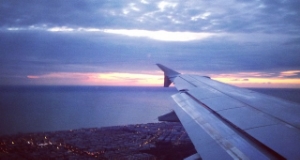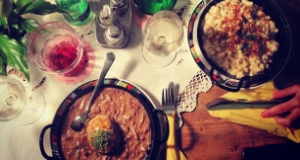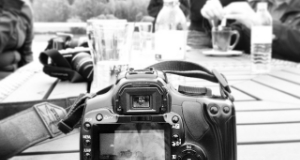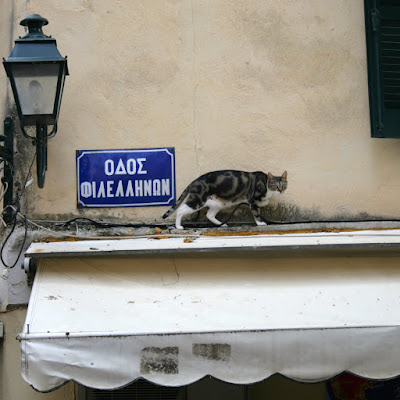While I waited on Sujin Lim at Wellen.Spiel in Krems, I thought about which works I have already seen. Firstly, the Lower Austrian Cultural Art prize winner's critique about global systems has been exhibited at NÖ dok in St. Pölten. Secondly, I got to know her works in our monthly AIR-ARTIST IN RESIDENCE meetings.
Being a foreigner was a topic in Krems. "When I was at the river and recorded, people often wanted to speak with me." Her Asian attributes offer Sujin ways to communicate with people from Krems. The artist tells about meeting an elderly woman at the river, who offered her a bag full of old, baked bread to feed to the birds. Non-verbally, because the woman could not understand or speak English and Sujin could not understand or speak in German. But Sujin takes what it gets to help this woman spread her bread. The woman's face lightens up and she smiles. Encounters like these touch people's hearts and Sujin tells this story as if it was a revelation.
Sujin is a story teller. She uncovers. She offers people new perspectives of their environment. She acts very sensible to reverse perspectives. "There is always a way..." she tells me. I was very impressed of her poetical way to deal with law and order in strict autocrat systems like when she was in Iran. Dancing to music is prohibited. You are not allowed to move your body to the sound of melodies - you will be punished for it. In her eleven minute film Sujin avoids these rules in a very simple but effective way: she moves on the streets, on squares, between people - very slowly and very dance-like. No music but the voice of the streets: cars and people. After a few minutes classical music starts to play and the moving person becomes a dancer. Suddenly, Sujin moves the perspective very clearly for the observer. The artist plays with those changes of views.
The Missed Scenery and The Missed Event from Sujin Lim on Vimeo
FACTORyAL LANDSCAPE from Sujin Lim on Vimeo.
Citizen of the world
Shortly afterwards Sujin Lim appears at the cafe - "Am I late?" - I negate. The last days of the South Korean artist in Krems have begun, although she calls herself foreigner in any parts of the world. After her try to order in German (Apfelschorle is just not Austrian German), the two of us concentrate on getting to know each other on a professional basis: why do I think Sujin's art is very special? Where does her overall quietness and steadiness come from to deal with difficult and deep topics? How has Krems inspired her?Being a foreigner was a topic in Krems. "When I was at the river and recorded, people often wanted to speak with me." Her Asian attributes offer Sujin ways to communicate with people from Krems. The artist tells about meeting an elderly woman at the river, who offered her a bag full of old, baked bread to feed to the birds. Non-verbally, because the woman could not understand or speak English and Sujin could not understand or speak in German. But Sujin takes what it gets to help this woman spread her bread. The woman's face lightens up and she smiles. Encounters like these touch people's hearts and Sujin tells this story as if it was a revelation.
Sujin is a story teller. She uncovers. She offers people new perspectives of their environment. She acts very sensible to reverse perspectives. "There is always a way..." she tells me. I was very impressed of her poetical way to deal with law and order in strict autocrat systems like when she was in Iran. Dancing to music is prohibited. You are not allowed to move your body to the sound of melodies - you will be punished for it. In her eleven minute film Sujin avoids these rules in a very simple but effective way: she moves on the streets, on squares, between people - very slowly and very dance-like. No music but the voice of the streets: cars and people. After a few minutes classical music starts to play and the moving person becomes a dancer. Suddenly, Sujin moves the perspective very clearly for the observer. The artist plays with those changes of views.
Nuclear Power Plants, a tough topic
Why Sujin likes to think about nuclear power plants is still a riddle for me. It must be between fascination, knowledge and aversion about this controversial way to win energy. "I could not go to Japan, after Fukushima,...", she states. Due to health and well being she decided not to look closer into the nuclear incident after tsunami in 2011. But Sujin actually came to Krems not to think about too much about nuclear power anymore. Sujin did not calculate Austrian history into her negation. Together with curator Verena Gamper she visited AKW Zwentendorf closeby which as, due to major demonstrations in the 1970s, never been activated. But the building is there. Now it's a plant for solar energy. Oppressive, might be the feeling expressed the most. The South Korean world citizen has a very sensitive way to deal with topics like nuclear power. In Taiwan she looked closer into relation between nature and industry. Missed Scenery and Missed Event draws attention to a crack of nature which Sujin takes to restate the meaning. A nuclear power plant in the back is replaced of a paintingThe Missed Scenery and The Missed Event from Sujin Lim on Vimeo
It was just too perfect.
While Sujin was in Switzerland, she could not decide on what to work on because everything was beautiful, clear and intact. FACTORyAl LANDSCAPE, describes how a global world apparently works:FACTORyAL LANDSCAPE from Sujin Lim on Vimeo.






















